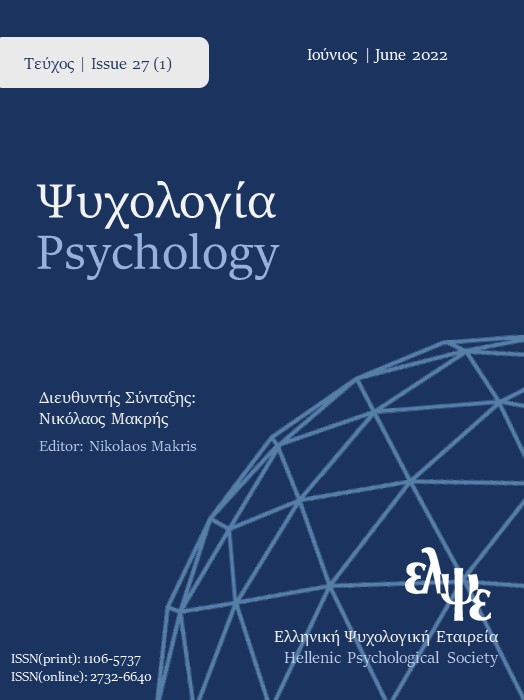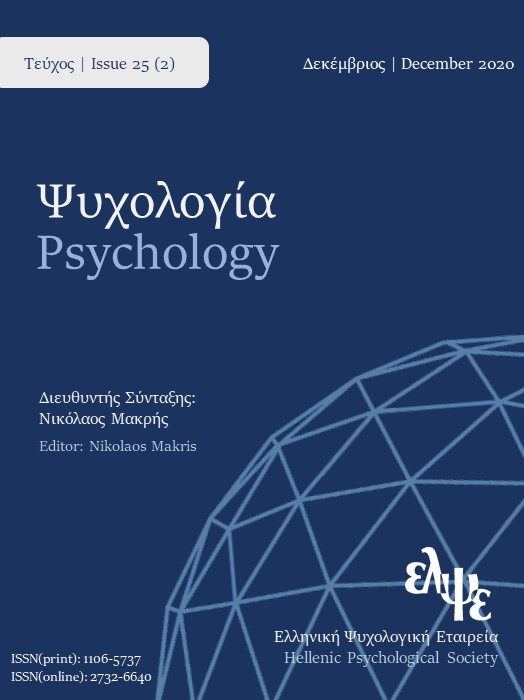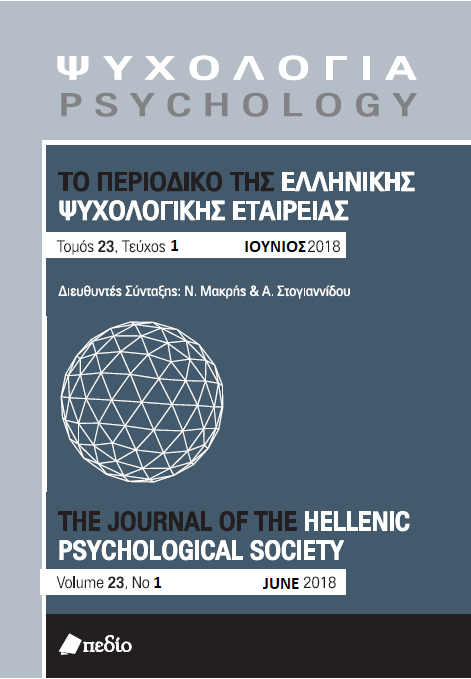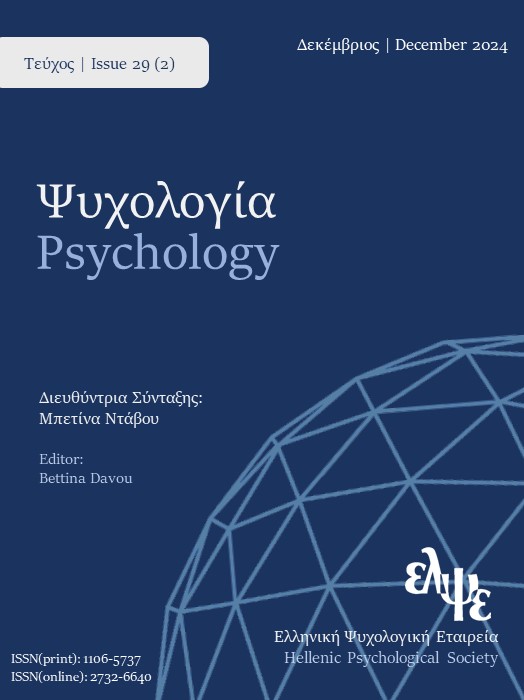Διερεύνηση των σχέσεων της γονικότητας με την εκδήλωση τελειοθηρίας σε φοιτητικό πληθυσμό
Περίληψη
Basirion, Z., Majid, R. A., & Jelas, Z. M. (2014). Big five personality factors, perceived parenting styles, and perfectionism among academically gifted students. Asian Social Science, 10(4), 8-15. doi:10.5539/ass.v10n4p8
Baumrind, D. (1971). Current patterns of parental authority. Developmental Psychology, 4(1, Pt.2), 1-103. doi:10.1037/h0030372
Baumrind, D. (1991). The influence of parenting style on adolescent competence and substance use. Journal of Early Adolescence, 11(1), 56-95. doi:10.1177/0272431691111004
Besharat, M. A, Azizi, K., & Poursharifi, H. (2011). The relationship between parenting styles and children’s perfectionism in a sample of Iranian families. Procedia-Social and Behavioral Sciences, 15, 1280-1283. doi:10.1016/j. sbspro.2011.03.277
Beuckelaer, A. D., & Lievens, F. (2009) Measurement equivalence of paper-and-pencil and internet organizational surveys: A large scale examination in 16 countries. Applied Psychology, 58, 336-361. doi:10.1111/j.1464-0597.2008.00350.x
Bieling, P. J., Israeli, A. L., & Antony, M. M. (2004). Is perfectionism good, bad, or both? Examining models of the perfectionism construct. Personality and Individual Differences, 36(6), 1373-1385. doi:10.1016/S0191-8869(03)00235-6 Buri, J. R. (1991). Parental authority questionnaire. Journal of Personality Assessment, 57(1), 110- 119. doi:10.1207/s15327752jpa5701_13
Burns, D. D. (1980). The perfectionist’s script for selfdefeat. Psychology Today, 14, 34-52. Craddock, A. E.,
Church, W., & Sands, A. (2009). Family of origin characteristics as predictors of perfectionism. Australian Journal of Psychology, 61(3), 136-144. doi:10.1080/00049530802239326
Damian, L. E., Stoeber, J., Negru, O., & Baban, A. (2013). On the development of perfectionism in adolescence: Perceived parental expectations predict longitudinal increases in socially prescribed perfectionism. Personality and Individual Differences, 55(6), 688-693. doi:10.1016/j.paid.2013.05.021
Diamantopoulou, G., & Platsidou, M. (2014). Factorial validity and psychometric properties of the greek version of the Almost Perfect Scale-Revised (APS-R). Hellenic Journal of Psychology, 11, 123-137.
Enns, M. W., & Cox, B. J. (2002). The nature and assessment of perfectionism: Α critical analysis. In G. L. Flett, & P. L. Hewitt (Eds.), Perfectionism: Theory, Research, and Treatment (pp. 33-62). Washington, DC: American Psychological Association. doi:10.1037/10458-002
Flett, G. L., Hewitt, P. L., & Singer, A. (1995). Perfectionism and parental authority styles. Individual Psychology: Journal of Adlerian Theory, Research & Practice, 51(1), 50-60.
Flett, G.L., & Hewitt, P.L. (2002). Perfectionism and maladjustment: An overview of theoretical, definitional, and treatment issues. In G. L. Flett, & P. L. Hewitt (Eds.), Perfectionism: Theory, research, and treatment (pp. 5-13). Washington, DC: American Psychological Association. doi. org/10.1037/10458-001
Flett, G. L., Hewitt, P. L., Oliver, J. M., & Macdonald, S. (2002). Perfectionism in children and their parents: A developmental analysis. In G. L. Flett, & P. L. Hewitt (Eds.), Perfectionism: Theory, Research, and Treatment (pp. 89-132). Washington, DC: American Psychological Association. doi:10.1037/10458-004
Frost, R. O., Heimberg, R. G., Holt, C. S., Mattia, J. I., & Neubauer, A. L. (1993). A comparison of two measures of perfectionism. Personality and Individual Differences, 14(1), 119-126. doi:10.1016/0191-8869(93)90181-2
Frost, R. O., Marten, P., Lahart, C., & Rosenblate, R. (1990). The dimensions of perfectionism. Cognitive Therapy and Research, 14(5), 449-468. doi:10.1007/BF01172967
Gilman, R., & Ashby, J. S. (2003). Multidimensional perfectionism in a sample of middle school students: An exploratory investigation. Psychology in the Schools, 40(6), 677-689. doi:10.1002/pits.10125
Gong, X., Fletcher, K. L., & Bolin, J. H. (2015). Dimensions of perfectionism mediate the relationship between parenting styles and coping. Journal of Counseling & Development, 93, 259-268. doi:10.1002/jcad.12024
Gosling, S. D., Vazire, S., Srivastava, S., & John, O. P. (2004). Should we trust web-based studies? A comparative analysis of six preconceptions about internet questionnaires. American Psychologist, 59(2), 93-104. doi:10.1037/0003-066X.59.2.93
Hamachek, D. E. (1978). Psychodynamics of normal and neurotic perfectionism. Psychology: A Journal of Human Behavior, 15(1), 27-33.
Hewitt, P. L., & Flett, G. L. (1990). Perfectionism and depression: A multidimensional analysis. Journal of Social Behavior and Personality, 5, 423-438.
Hibbard, D. R., Walton, G. E., & State, C. (2012). Where does perfectionism come from? A qualitative investigation of perfectionists and nonperfectionists. Social Behavior and Personality, 40(7), 1121-1122. doi:10.2224/ sbp.2012.40.7.1121
Hibbard, D. R., & Walton, G. E. (2014). Exploring the development of perfectionism: The influence of parenting style and gender. Social Behavior and Personality: An International Journal, 42(2), 269- 278. doi:10.2224/sbp.2014.42.2.269
Hollender, M. H.(1965). Perfectionism . Comprehensive Psychiatry, 6, 94-103.
Joinson, A. (1999). Social desirability, anonymity, and Intemet-based questionnaires. Behavior Research Methods, Instruments, & Computers, 31(3), 433-438.
Kawamura, K. Y., Frost, R. O., & Harmatz, M. G. (2002). The relationship of perceived parenting styles to perfectionism. Personality and Individual Differences, 32(2), 317-327. doi:10.1016/S0191- 8869(01)00026-5
Knapp, H., & Kirk, S. A. (2003). Using pencil and paper, internet and touch-tone phones for self-administered surveys: Does methodology matter? Computers in Human Behavior, 19(1), 117-134. doi:10.1016/S0747-5632(02)00008-0
Kontrimiene, S. (2014). Rrelationships between adaptive and maladaptive perfectionism and perceived parenting styles in a sample of university students. Acta Paedagogica Vilnensia, 33, 96-115.
Lewis, I. M., Watson, B. C., & White, K. M. (2009). Internet versus paper-and-pencil survey methods in psychological experiments: Equivalence testing of participant responses to health-related messages. Australian Journal of Psychology, 61(2), 107-116. doi:10.1080/00049530802105865
Methikalam, B., Wang, K. T., Slaney, R. B., & Yeung, J. G. (2015). Asian values, personal and family perfectionism, and mental health among Asian Indians in the United States. Asian American Journal of Psychology, 6(3), 223-232. doi:10.1037/aap0000023
Miller, A. L., Lambert, A. D., & Speirs Neumeister, K. L. (2012). Parenting style, perfectionism, and creativity in high-ability and high-achieving young adults. Journal for the Education of the Gifted, 35(4), 344-365. doi:10.1177/0162353212459257
Miller, A. L., & Speirs Neumeister, K. L. (2017). Journal of Advanced Academics, 28(4), 313-344. doi:10.1177/1932202X17730567
Missildine, W. H. (1963). Your inner child of the past. New York: Simon & Schuster.
Olson, J. (2012). Parenting style and its relationship to perfectionism (Doctoral dissertation). Retrieved from ProQuest Dissertations Publishing.
Ortega, N. E., Wang, K. T., Slaney, R. B., Hayes, J. A., & Morales, A. (2013). Personal and Familial Aspects of Perfectionism in Latino/a Students. The Counselling Psychologist, 42(3), 406-427. doi:10.1177/0011000012473166
Pacht, A. R. (1984). Reflections on perfection. American Psychologist, 39(4), 386-390. doi:10.1037/0003-066X.39.4.386
Παπάζογλου, Σ. (2018). Ιδιότυποι Τρόποι Απόκρισης: Σύγκριση μεταξύ παραδοσιακών συνθηκών μέ- τρησης και συνθηκών συμμετοχής σε διαδικτυα- κή έρευνα. (Αδημοσίευτη διδακτορική διατριβή). Εθνικό και Καποδιστριακό Πανεπιστήμιο Αθη- νών, Αθήνα, Ελλάδα.
Pastor, D. A. (2010). Cluster analysis. In G. R. Hancock & R. O. Mueller (Eds.), Quantitative methods in the social and behavioral sciences: A guide for researchers and reviewers (pp. 41-54). New York, NY: Taylor & Francis.
Rice, K. G., Ashby, J. S., & Gilman, R. (2011). C l a s s i f y i n g a d o l e s c e n t p e r f e c t i o n i s t s . Psychological Assessment, 23(3), 563-577. doi:10.1037/a0022482
Rice, K. G., & Slaney, R. B. (2002). Clusters of perfectionists: Two studies of emotional adjustment and academic achievement. Measurement and Evaluation in Counselling and Development, 35(1), 35-48.
Shih, T-H., & Fan, X. (2008). Comparing response rates from web and mail surveys: A metaanalysis. Field Methods, 20(3), 249-271. doi:10.1177/1525822X08317085
Slade, P. D., & Owens, R. (1998). A dual process model of perfectionism based on reinforcement theory. Behavior Modification, 22, 372-390. doi:10.1177/01454455980223010
Slaney, R. B., Mobley, M., Trippi, J., Ashby, J., & Johnson, D. G. (1996). The Almost Perfect Scale-Revised. Unpublished manuscript, The Pennsylvania State University, University Park, PA. Slaney, R., Rice, K., Mobley, M., Trippi, J., & Ashby, J. S. (2001). The Revised Almost Perfect Scale. Measurement and Evaluation in Counseling and Development, 34(3), 130-145.
Slaney, R. B., Rice, K. G., & Ashby, J. S. (2002). A programmatic approach to measuring perfectionism: The Almost Perfect Scale. In G. L. Flett & P. L. Hewitt (Eds.), Perfectionism: Theory, research, and treatment (pp. 63-88). Washington, DC: American Psychological Association. doi:10.1037/10458-003
Soysa, C. K., & Weiss, A. (2014). Mediating perceived parenting styles-test anxiety relationships: Academic procrastination and maladaptive perfectionism. Learning and Individual Differences, 34, 77-85. doi:10.1016/j.lindif.2014.05.004
Speirs Neumeister, K. L. (2004). Factors influencing the development of perfectionism in gifted college students. Gifted Child Quarterly, 48(4), 259-274. doi: 10.1177/001698620404800402
Τσαούσης, Ι. (2002). Το γονεϊκό μοντέλο διαπαιδα- γώγησης και η αυτοεκτίμηση του μαθητή ως μεταβλητές εμφάνισης προβληματικής συμπε- ριφοράς στο περιβάλλον του σχολείου. Στο Ν. Πολεμικός, Μ. Καϊλα & Φ. Καλαβάσης (Επιμ.), Εκπαιδευτική, Οικογενειακή και Πολιτική Ψυχο- παθολογία (σσ. 274-303). Αθήνα: Ατραπός.
Walton, G. E., Hibbard, D. R., Coughlin, C., & Coyl- Shepherd, D. D. (2018). Parenting, personality, and culture as predictors of perfectionism. Current Psychology(January), 1-13. doi:10.1007/ s12144-018-9793-y Wang, K. T. (2010). The Family Almost Perfect Scale: Development, psychometric properties, and comparing Asian and European Americans. Asian American Journal of Psychology, 1(3), 186- 199. doi:10.1037/a0020732
Wang, K. T., Methikalam, B., & Slaney, R. B. (2010). Family Almost Perfect Scale. Unpublished manuscript, The Pennsylvania State University, University Park, PA.
Wang, K. T. (2012). Personal and family perfectionism of Taiwanese college students: Relationships with depression, self-esteem, achievement motivation and academic grades. Interntional Journal of Psychology, 47(4), 305- 314. doi: 10.1080/00207594.2011.626050
Weigold, A., Weigold, I. K., & Russell, E. J. (2013). Examination of the equivalence of self-report survey-based paper-and-pencil and internet data collection methods. Psychological Methods, 18(1), 53-70. doi:10.1037/a0031607
Basirion, Z., Majid, R. A., & Jelas, Z. M. (2014). Big five personality factors, perceived parenting styles, and perfectionism among academically gifted students. Asian Social Science, 10(4), 8-15. doi:10.5539/ass.v10n4p8
Baumrind, D. (1971). Current patterns of parental authority. Developmental Psychology, 4(1, Pt.2), 1-103. doi:10.1037/h0030372
Baumrind, D. (1991). The influence of parenting style on adolescent competence and substance use. Journal of Early Adolescence, 11(1), 56-95. doi:10.1177/0272431691111004
Besharat, M. A, Azizi, K., & Poursharifi, H. (2011). The relationship between parenting styles and children’s perfectionism in a sample of Iranian families. Procedia-Social and Behavioral Sciences, 15, 1280-1283. doi:10.1016/j. sbspro.2011.03.277
Beuckelaer, A. D., & Lievens, F. (2009) Measurement equivalence of paper-and-pencil and internet organizational surveys: A large scale examination in 16 countries. Applied Psychology, 58, 336-361. doi:10.1111/j.1464-0597.2008.00350.x
Bieling, P. J., Israeli, A. L., & Antony, M. M. (2004). Is perfectionism good, bad, or both? Examining models of the perfectionism construct. Personality and Individual Differences, 36(6), 1373-1385. doi:10.1016/S0191-8869(03)00235-6 Buri, J. R. (1991). Parental authority questionnaire. Journal of Personality Assessment, 57(1), 110- 119. doi:10.1207/s15327752jpa5701_13
Burns, D. D. (1980). The perfectionist’s script for selfdefeat. Psychology Today, 14, 34-52. Craddock, A. E.,
Church, W., & Sands, A. (2009). Family of origin characteristics as predictors of perfectionism. Australian Journal of Psychology, 61(3), 136-144. doi:10.1080/00049530802239326
Damian, L. E., Stoeber, J., Negru, O., & Baban, A. (2013). On the development of perfectionism in adolescence: Perceived parental expectations predict longitudinal increases in socially prescribed perfectionism. Personality and Individual Differences, 55(6), 688-693. doi:10.1016/j.paid.2013.05.021
Diamantopoulou, G., & Platsidou, M. (2014). Factorial validity and psychometric properties of the greek version of the Almost Perfect Scale-Revised (APS-R). Hellenic Journal of Psychology, 11, 123-137.
Enns, M. W., & Cox, B. J. (2002). The nature and assessment of perfectionism: Α critical analysis. In G. L. Flett, & P. L. Hewitt (Eds.), Perfectionism: Theory, Research, and Treatment (pp. 33-62). Washington, DC: American Psychological Association. doi:10.1037/10458-002
Flett, G. L., Hewitt, P. L., & Singer, A. (1995). Perfectionism and parental authority styles. Individual Psychology: Journal of Adlerian Theory, Research & Practice, 51(1), 50-60.
Flett, G.L., & Hewitt, P.L. (2002). Perfectionism and maladjustment: An overview of theoretical, definitional, and treatment issues. In G. L. Flett, & P. L. Hewitt (Eds.), Perfectionism: Theory, research, and treatment (pp. 5-13). Washington, DC: American Psychological Association. doi. org/10.1037/10458-001
Flett, G. L., Hewitt, P. L., Oliver, J. M., & Macdonald, S. (2002). Perfectionism in children and their parents: A developmental analysis. In G. L. Flett, & P. L. Hewitt (Eds.), Perfectionism: Theory, Research, and Treatment (pp. 89-132). Washington, DC: American Psychological Association. doi:10.1037/10458-004
Frost, R. O., Heimberg, R. G., Holt, C. S., Mattia, J. I., & Neubauer, A. L. (1993). A comparison of two measures of perfectionism. Personality and Individual Differences, 14(1), 119-126. doi:10.1016/0191-8869(93)90181-2
Frost, R. O., Marten, P., Lahart, C., & Rosenblate, R. (1990). The dimensions of perfectionism. Cognitive Therapy and Research, 14(5), 449-468. doi:10.1007/BF01172967
Gilman, R., & Ashby, J. S. (2003). Multidimensional perfectionism in a sample of middle school students: An exploratory investigation. Psychology in the Schools, 40(6), 677-689. doi:10.1002/pits.10125
Gong, X., Fletcher, K. L., & Bolin, J. H. (2015). Dimensions of perfectionism mediate the relationship between parenting styles and coping. Journal of Counseling & Development, 93, 259-268. doi:10.1002/jcad.12024
Gosling, S. D., Vazire, S., Srivastava, S., & John, O. P. (2004). Should we trust web-based studies? A comparative analysis of six preconceptions about internet questionnaires. American Psychologist, 59(2), 93-104. doi:10.1037/0003-066X.59.2.93
Hamachek, D. E. (1978). Psychodynamics of normal and neurotic perfectionism. Psychology: A Journal of Human Behavior, 15(1), 27-33.
Hewitt, P. L., & Flett, G. L. (1990). Perfectionism and depression: A multidimensional analysis. Journal of Social Behavior and Personality, 5, 423-438.
Hibbard, D. R., Walton, G. E., & State, C. (2012). Where does perfectionism come from? A qualitative investigation of perfectionists and nonperfectionists. Social Behavior and Personality, 40(7), 1121-1122. doi:10.2224/ sbp.2012.40.7.1121
Hibbard, D. R., & Walton, G. E. (2014). Exploring the development of perfectionism: The influence of parenting style and gender. Social Behavior and Personality: An International Journal, 42(2), 269- 278. doi:10.2224/sbp.2014.42.2.269
Hollender, M. H.(1965). Perfectionism . Comprehensive Psychiatry, 6, 94-103.
Joinson, A. (1999). Social desirability, anonymity, and Intemet-based questionnaires. Behavior Research Methods, Instruments, & Computers, 31(3), 433-438.
Kawamura, K. Y., Frost, R. O., & Harmatz, M. G. (2002). The relationship of perceived parenting styles to perfectionism. Personality and Individual Differences, 32(2), 317-327. doi:10.1016/S0191- 8869(01)00026-5
Knapp, H., & Kirk, S. A. (2003). Using pencil and paper, internet and touch-tone phones for self-administered surveys: Does methodology matter? Computers in Human Behavior, 19(1), 117-134. doi:10.1016/S0747-5632(02)00008-0
Kontrimiene, S. (2014). Rrelationships between adaptive and maladaptive perfectionism and perceived parenting styles in a sample of university students. Acta Paedagogica Vilnensia, 33, 96-115.
Lewis, I. M., Watson, B. C., & White, K. M. (2009). Internet versus paper-and-pencil survey methods in psychological experiments: Equivalence testing of participant responses to health-related messages. Australian Journal of Psychology, 61(2), 107-116. doi:10.1080/00049530802105865
Methikalam, B., Wang, K. T., Slaney, R. B., & Yeung, J. G. (2015). Asian values, personal and family perfectionism, and mental health among Asian Indians in the United States. Asian American Journal of Psychology, 6(3), 223-232. doi:10.1037/aap0000023
Miller, A. L., Lambert, A. D., & Speirs Neumeister, K. L. (2012). Parenting style, perfectionism, and creativity in high-ability and high-achieving young adults. Journal for the Education of the Gifted, 35(4), 344-365. doi:10.1177/0162353212459257
Miller, A. L., & Speirs Neumeister, K. L. (2017). Journal of Advanced Academics, 28(4), 313-344. doi:10.1177/1932202X17730567
Missildine, W. H. (1963). Your inner child of the past. New York: Simon & Schuster.
Olson, J. (2012). Parenting style and its relationship to perfectionism (Doctoral dissertation). Retrieved from ProQuest Dissertations Publishing.
Ortega, N. E., Wang, K. T., Slaney, R. B., Hayes, J. A., & Morales, A. (2013). Personal and Familial Aspects of Perfectionism in Latino/a Students. The Counselling Psychologist, 42(3), 406-427. doi:10.1177/0011000012473166
Pacht, A. R. (1984). Reflections on perfection. AmericanPsychologist, 39(4), 386-390. doi:10.1037/0003-066X.39.4.386
Παπάζογλου, Σ. (2018). Ιδιότυποι Τρόποι Απόκρισης: Σύγκριση μεταξύ παραδοσιακών συνθηκών μέ- τρησης και συνθηκών συμμετοχής σε διαδικτυα- κή έρευνα. (Αδημοσίευτη διδακτορική διατριβή). Εθνικό και Καποδιστριακό Πανεπιστήμιο Αθη- νών, Αθήνα, Ελλάδα.
Pastor, D. A. (2010). Cluster analysis. In G. R. Hancock & R. O. Mueller (Eds.), Quantitative methods in the social and behavioral sciences: A guide for researchers and reviewers (pp. 41-54). New York, NY: Taylor & Francis.
Rice, K. G., Ashby, J. S., & Gilman, R. (2011). C l a s s i f y i n g a d o l e s c e n t p e r f e c t i o n i s t s . Psychological Assessment, 23(3), 563-577. doi:10.1037/a0022482
Rice, K. G., & Slaney, R. B. (2002). Clusters of perfectionists: Two studies of emotional adjustment and academic achievement. Measurement and Evaluation in Counselling and Development, 35(1), 35-48.
Shih, T-H., & Fan, X. (2008). Comparing response rates from web and mail surveys: A metaanalysis. Field Methods, 20(3), 249-271. doi:10.1177/1525822X08317085
Slade, P. D., & Owens, R. (1998). A dual process model of perfectionism based on reinforcement theory. Behavior Modification, 22, 372-390. doi:10.1177/01454455980223010
Slaney, R. B., Mobley, M., Trippi, J., Ashby, J., & Johnson, D. G. (1996). The Almost Perfect Scale-Revised. Unpublished manuscript, The Pennsylvania State University, University Park, PA. Slaney, R., Rice, K., Mobley, M., Trippi, J., & Ashby, J. S. (2001). The Revised Almost Perfect Scale. Measurement and Evaluation in Counseling and Development, 34(3), 130-145.
Slaney, R. B., Rice, K. G., & Ashby, J. S. (2002). A programmatic approach to measuring perfectionism: The Almost Perfect Scale. In G. L. Flett & P. L. Hewitt (Eds.), Perfectionism: Theory, research, and treatment (pp. 63-88). Washington, DC: American Psychological Association. doi:10.1037/10458-003
Soysa, C. K., & Weiss, A. (2014). Mediating perceived parenting styles-test anxiety relationships: Academic procrastination and maladaptive perfectionism. Learning and Individual Differences, 34, 77-85. doi:10.1016/j.lindif.2014.05.004
Speirs Neumeister, K. L. (2004). Factors influencing the development of perfectionism in gifted college students. GiftedChildQuarterly, 48(4), 259-274. doi: 10.1177/001698620404800402
Τσαούσης, Ι. (2002). Το γονεϊκό μοντέλο διαπαιδα- γώγησης και η αυτοεκτίμηση του μαθητή ως μεταβλητές εμφάνισης προβληματικής συμπε- ριφοράς στο περιβάλλον του σχολείου. Στο Ν. Πολεμικός, Μ. Καϊλα & Φ. Καλαβάσης (Επιμ.), Εκπαιδευτική, Οικογενειακή και Πολιτική Ψυχο- παθολογία (σσ. 274-303). Αθήνα: Ατραπός.
Walton, G. E., Hibbard, D. R., Coughlin, C., & Coyl- Shepherd, D. D. (2018). Parenting, personality, and culture as predictors of perfectionism. Current Psychology(January), 1-13. doi:10.1007/ s12144-018-9793-y Wang, K. T. (2010). The Family Almost Perfect Scale: Development, psychometric properties, and comparing Asian and European Americans. Asian American Journal of Psychology, 1(3), 186- 199. doi:10.1037/a0020732
Wang, K. T., Methikalam, B., & Slaney, R. B. (2010). Family Almost Perfect Scale. Unpublished manuscript, The Pennsylvania State University, University Park, PA.
Wang, K. T. (2012). Personal and family perfectionism of Taiwanese college students: Relationships with depression, self-esteem, achievement motivation and academic grades. Interntional Journal of Psychology, 47(4), 305- 314. doi: 10.1080/00207594.2011.626050
Weigold, A., Weigold, I. K., & Russell, E. J. (2013). Examination of the equivalence of self-report survey-based paper-and-pencil and internet data collection methods. Psychological Methods, 18(1), 53-70. doi:10.1037/a0031607
Λεπτομέρειες άρθρου
- Πώς να δημιουργήσετε Αναφορές
-
Czepiel, D., & Τάνταρος Σ. (2018). Διερεύνηση των σχέσεων της γονικότητας με την εκδήλωση τελειοθηρίας σε φοιτητικό πληθυσμό. Ψυχολογία: το περιοδικό της Ελληνικής Ψυχολογικής Εταιρείας, 23(2), 145–162. https://doi.org/10.12681/psy_hps.23006
- Τεύχος
- Τόμ. 23 Αρ. 2 (2018)
- Ενότητα
- ΕΜΠΕΙΡΙΚΕΣ ΕΡΓΑΣΙΕΣ

Αυτή η εργασία είναι αδειοδοτημένη υπό το Creative Commons Attribution-ShareAlike 4.0 International License.
Το περιοδικό ΨΥΧΟΛΟΓΙΑ έχει υιοθετήσει μία πολιτική Platinum open-access. Τα έξοδα υποβολής, επεξεργασίας ή δημοσίευσης των εργασιών καλύπτονται από την Ελληνική Ψυχολογική Εταιρεία. Τα πνευματικά δικαιώματα των δημοσιευμένων εργασιών προστατεύονται από την άδεια 'Creative Commons Attribution-ShareAlike 4.0 International'. Οι Συγγραφείς διατηρούν τα Πνευματικά Δικαιώματα και χορηγούν στο περιοδικό το δικαίωμα της πρώτης δημοσίευσης. Η άδεια αυτή επιτρέπει σε τρίτους, να χρησιμοποιούν την εργασία σε οποιαδήποτε μορφή, με την προϋπόθεση της διατήρησης των διατυπώσεων που προβλέπονται στην άδεια σχετικά με την αναφορά στον αρχικό δημιουργό και την αρχική δημοσίευση στο περιοδικό ΨΥΧΟΛΟΓΙΑ. Επιπλέον, κάθε διανομή της εργασίας οφείλει να γίνεται με τους ίδιους όρους διανομής, δηλαδή με την ίδια άδεια Creative Commons.








